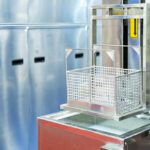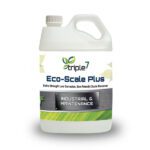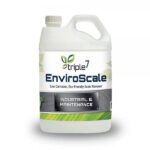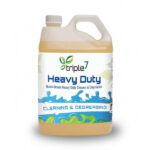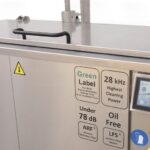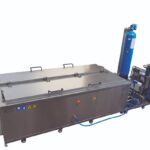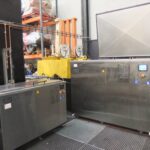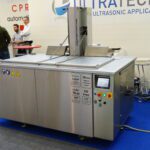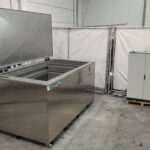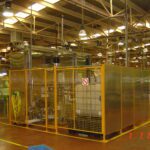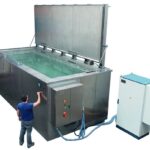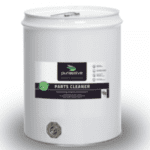Table of Contents
The Impact of How We Clean Heat Exchangers
When I think about the daily operations of so many industries—whether it’s in manufacturing, energy, or petrochemicals—there’s one thing that’s often quietly at work behind the scenes: heat exchangers. These vital pieces of equipment ensure that processes run smoothly by transferring heat efficiently. But here’s the kicker: when these heat exchangers aren’t properly maintained and cleaned, everything starts to go downhill—energy consumption spikes, operational costs soar, and before you know it, you’re dealing with unexpected downtime.
Traditionally, the go-to method for cleaning heat exchangers has involved some pretty harsh chemicals. Sure, they get the job done, but at what cost? These chemicals often pose serious environmental hazards, yet many organizations still haven’t fully embraced the idea of using biodegradable solutions in their automated cleaning systems. Why is that? Well, it all comes down to the belief systems that organizations operate under—mindsets that sometimes hold them back from making more sustainable choices. In this blog, I want to explore those belief systems and share why integrating biodegradable solutions in automated cleaning systems for heat exchangers is not just the right thing to do for the planet but also a smart business move.
Understanding Organizational Belief Systems: What’s Holding Us Back?
Every organization has its own set of beliefs—ways of thinking that influence decisions, big and small. When it comes to cleaning heat exchangers, some of these beliefs can prevent companies from considering biodegradable options. Let’s break them down:
Cost-Centric Mindset: For many organizations, the first question is, “How much is this going to cost?” It’s easy to see why biodegradable products might seem like an unnecessary expense, especially if the immediate benefits aren’t clear. But this short-term thinking often overlooks the long-term savings and environmental impact.
Efficacy Doubts: There’s a common worry that biodegradable cleaning agents just don’t stack up against traditional chemicals. If something is ‘green’ or ‘natural,’ it must be less effective, right? Not necessarily, but this misconception persists and can make organizations hesitant to switch.
Compliance and Regulation: Some companies operate in regions where environmental regulations are either lax or poorly enforced. This can lead to a mindset where meeting the bare minimum is good enough, and there’s little incentive to go beyond what’s required by law.
Resistance to Change: Let’s face it—change is hard. When a process has been in place for years, there’s a natural resistance to doing things differently. Add to that a lack of awareness or understanding of biodegradable options, and it’s no wonder that organizations stick with what they know.
Short-Term Focus: In the hustle and bustle of day-to-day operations, it’s easy to prioritize what’s quick and convenient. Chemical cleaning agents are familiar, and switching to biodegradable solutions might seem like an unnecessary complication, even if the long-term benefits are substantial.
Why Biodegradability Matters in Heat Exchanger Cleaning Solutions
So, why should organizations care about biodegradable cleaning solutions? The answer lies in the many benefits that go hand-in-hand with making this switch. Here are some key points to consider:
Environmental Impact: We all know that the environment is under strain, and every little bit helps. Biodegradable cleaning agents break down naturally, which means they don’t linger in ecosystems or contribute to pollution. By reducing the environmental footprint of maintenance activities, companies can play a part in protecting our planet.
Health and Safety: Safety should always be a priority. Using biodegradable solutions means less exposure to hazardous chemicals for workers, which leads to a healthier workplace and fewer chemical-related health issues. That’s a win-win for everyone.
Regulatory Compliance: Environmental regulations are tightening up around the world, and companies that don’t adapt could find themselves facing legal and financial penalties. By adopting biodegradable solutions, organizations can stay ahead of the curve and ensure they’re compliant with the latest standards.
Long-Term Cost Savings: Biodegradable products might indeed come with a higher price tag upfront, but long-term savings are where the real value lies. Think about it—less money spent on hazardous chemical disposal, a longer lifespan for equipment, and healthier workers. It all adds up to significant savings over time.
Corporate Social Responsibility (CSR): In today’s world, CSR isn’t just a buzzword—it’s a business imperative. Customers, stakeholders, and communities are watching, and they care about how companies treat the environment. Embracing biodegradable solutions is a powerful way to show that your organization is committed to sustainability, which can boost your reputation and even attract new business.
Bringing Automation and Biodegradability Together
Automated cleaning systems for heat exchangers have been a game-changer for many industries. These systems provide consistent, efficient, and thorough cleaning, reducing downtime and running operations smoothly. But what if we took it a step further by integrating biodegradable solutions into these automated systems? Here’s how that could look:
Consistency and Efficiency: Automated cleaning systems are already designed to deliver consistent results, and when you add biodegradable agents into the mix, you maximize their effectiveness. These agents can be applied uniformly, ensuring that all surfaces are properly cleaned without leaving behind harmful residues.
Reduced Chemical Usage: One of the great things about automation is the precision it offers. With automated systems, you can control exactly how much cleaning agent is used, which means you’re not overusing chemicals. This not only reduces environmental impact but also cuts down on costs.
Enhanced Safety: We’ve already talked about how biodegradable solutions are safer for workers, but when you combine them with automated systems, the benefits are even greater. Automation reduces the need for manual handling of chemicals, so workers are less exposed to any potential hazards.
Scalability: Every industry has its unique challenges, but one of the strengths of automated systems is their scalability. Whether you’re in a small facility or a large industrial plant, these systems can be adapted to meet your needs. This flexibility makes it easier to integrate biodegradable solutions into your existing processes.
Case Study: How ESP’s Biodegradable Scale Remover Made a Difference
Let me share a real-life example that demonstrates the power of biodegradable solutions. A leading petrochemical manufacturing plant near Chennai, in South India, was facing ongoing issues with scale buildup in their heat exchangers. Their usual cleaning process relied on harsh chemicals, which not only posed risks to worker safety but also raised concerns about environmental impact and disposal costs.
The plant’s management knew they needed a more sustainable solution, so they turned to us at ESP. We recommended our biodegradable scale remover liquid, a product we’ve developed from natural ingredients like corn, soy, and palm oils. This solution was designed to be tough on scale but gentle on the environment.
Problem Situation:
The plant’s heat exchangers were experiencing frequent scaling, leading to reduced efficiency and increased energy consumption. The chemical cleaning agents they had been using were effective, but the safety risks and disposal costs were becoming untenable.
Possible Solutions:
The plant considered several options, including mechanical cleaning, traditional chemical cleaning, and biodegradable cleaning agents. Mechanical cleaning was ruled out due to the complexity and downtime involved, while chemical cleaning, though effective, was associated with significant health and environmental risks.
Our Solution and Why It Was the Best Alternative:
ESP’s biodegradable scale remover liquid stood out as the optimal choice. Here’s why:
Effectiveness: Our product effectively dissolved scale and deposits, restoring the heat exchangers to optimal performance levels.
Safety: The switch to our biodegradable solution led to a significant reduction in chemical-related incidents, greatly enhancing worker safety.
Environmental Impact: The biodegradable nature of the solution meant that the plant’s environmental footprint was minimized, aligning with its sustainability goals.
Cost Savings: The plant saw long-term cost savings through reduced hazardous chemical disposal needs and improved equipment efficiency.
Conclusion: Making the Shift to Sustainable Solutions
Integrating biodegradable solutions into automated heat exchanger cleaning processes isn’t just about being environmentally responsible—it’s a strategic decision that comes with a host of benefits. At ESP, we’re committed to advancing sustainable cleaning technologies that enhance operational efficiency, protect worker health, and preserve the environment.
As the global focus on sustainability intensifies, it’s time for organizations to take a hard look at their belief systems and consider how biodegradable solutions can play a role in exchanger maintenance. By doing so, they can achieve a balance between operational efficiency, cost savings, and environmental stewardship.
Future Directions: What’s Next for ESP?
Our journey doesn’t stop here. At ESP, we’re continually investing in research and development to enhance our biodegradable cleaning solutions. We’re exploring advanced formulations and technologies that offer even greater value and efficiency. Our goal is to lead the industry in providing sustainable alternatives that meet the evolving needs of our customers while contributing to a healthier planet.
Final Thoughts: Changing Beliefs, Changing Outcomes
Shifting the belief systems within an organization to prioritize biodegradability in automated heat exchanger cleaning requires more than just good intentions. It calls for education, evidence of the benefits, and alignment with broader sustainability goals. By addressing the underlying concerns and showing how biodegradable solutions can lead to better outcomes, we can help organizations transition to more sustainable practices. At ESP, we’re proud to be at the forefront of this movement, providing innovative solutions that make a positive impact on both industry and the environment.


